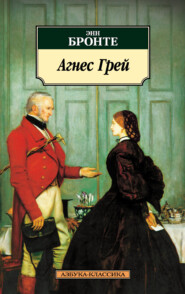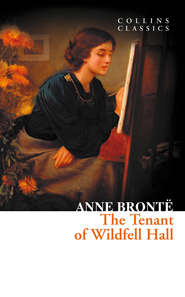По всем вопросам обращайтесь на: info@litportal.ru
(©) 2003-2025.
✖
The Tenant of Wildfell Hall
Настройки чтения
Размер шрифта
Высота строк
Поля
Poor Milicent! But I cannot imagine she will ever be led to accept such a suitor – one so repugnant to all her ideas of a man to be honoured and loved.
5th. – Alas! I was mistaken. I have got a long letter from her this morning, telling me she is already engaged, and expects to be married before the close of the month.
'I hardly know what to say about it,' she writes, 'or what to think. To tell you the truth, Helen, I don't like the thoughts of it at all. If I am to be Mr. Hattersley's wife, I must try to love him; and I do try with all my might; but I have made very little progress yet; and the worst symptom of the case is, that the further he is from me the better I like him: he frightens me with his abrupt manners and strange hectoring ways, and I dread the thoughts of marrying him. "Then why have you accepted him?" you will ask; and I didn't know I had accepted him; but mamma tells me I have, and he seems to think so too. I certainly didn't mean to do so; but I did not like to give him a flat refusal, for fear mamma should be grieved and angry (for I knew she wished me to marry him), and I wanted to talk to her first about it: So I gave him what I thought was an evasive, half negative answer; but she says it was as good as an acceptance, and he would think me very capricious if I were to attempt to draw back – and indeed I was so confused and frightened at the moment, I can hardly tell what I said. And next time I saw him, he accosted me in all confidence as his affianced bride, and immediately began to settle matters with mamma. I had not courage to contradict them then, and how can I do it now? I cannot; they would think me mad. Besides, mamma is so delighted with the idea of the match; she thinks she has managed so well for me; and I cannot bear to disappoint her. I do object sometimes, and tell her what I feel, but you don't know how she talks. Mr. Hattersley, you know, is the son of a rich banker, and as Esther and I have no fortunes, and Walter very little, our dear mamma is very anxious to see us all well married, that is, united to rich partners. It is not my idea of being well married, but she means it all for the best. She says when I am safe off her hands it will be such a relief to her mind; and she assures me it will be a good thing for the family as well as for me. Even Walter is pleased at the prospect, and when I confessed my reluctance to him, he said it was all childish nonsense. Do you think it nonsense, Helen? I should not care if I could see any prospect of being able to love and admire him, but I can't. There is nothing about him to hang one's esteem and affection upon; he is so diametrically opposite to what I imagined my husband should be. Do write to me, and say all you can to encourage me. Don't attempt to dissuade me, for my fate is fixed: preparations for the important event are already going on around me; and don't say a word against Mr. Hattersley, for I want to think well of him; and though I have spoken against him myself, it is for the last time: hereafter, I shall never permit myself to utter a word in his dispraise, however he may seem to deserve it; and whoever ventures to speak slightingly of the man I have promised to love, to honour, and obey, must expect my serious displeasure. After all, I think he is quite as good as Mr. Huntingdon, if not better; and yet you love him, and seem to be happy and contented; and perhaps I may manage as well. You must tell me, if you can, that Mr. Hattersley is better than he seems – that he is upright, honourable, and open– hearted – in fact, a perfect diamond in the rough. He may be all this, but I don't know him. I know only the exterior, and what, I trust, is the worst part of him.'
She concludes with 'Good-by, dear Helen. I am waiting anxiously for your advice – but mind you let it be all on the right side.'
Alas! poor Milicent, what encouragement can I give you? or what advice – except that it is better to make a bold stand now, though at the expense of disappointing and angering both mother and brother and lover, than to devote your whole life, hereafter, to misery and vain regret?
Saturday, 13th. – The week is over, and he is not come. All the sweet summer is passing away without one breath of pleasure to me or benefit to him. And I had all along been looking forward to this season with the fond, delusive hope that we should enjoy it so sweetly together; and that, with God's help and my exertions, it would be the means of elevating his mind, and refining his taste to a due appreciation of the salutary and pure delights of nature, and peace, and holy love. But now – at evening, when I see the round red sun sink quietly down behind those woody hills, leaving them sleeping in a warm, red, golden haze, I only think another lovely day is lost to him and me; and at morning, when roused by the flutter and chirp of the sparrows, and the gleeful twitter of the swallows – all intent upon feeding their young, and full of life and joy in their own little frames – I open the window to inhale the balmy, soul-reviving air, and look out upon the lovely landscape, laughing in dew and sunshine – I too often shame that glorious scene with tears of thankless misery, because he cannot feel its freshening influence; and when I wander in the ancient woods, and meet the little wild flowers smiling in my path, or sit in the shadow of our noble ash-trees by the water-side, with their branches gently swaying in the light summer breeze that murmurs through their feathery foliage – my ears full of that low music mingled with the dreamy hum of insects, my eyes abstractedly gazing on the glassy surface of the little lake before me, with the trees that crowd about its bank, some gracefully bending to kiss its waters, some rearing their stately heads high above, but stretching their wide arms over its margin, all faithfully mirrored far, far down in its glassy depth – though sometimes the images are partially broken by the sport of aquatic insects, and sometimes, for a moment, the whole is shivered into trembling fragments by a transient breeze that sweeps the surface too roughly – still I have no pleasure; for the greater the happiness that nature sets before me, the more I lament that he is not here to taste it: the greater the bliss we might enjoy together, the more I feel our present wretchedness apart (yes, ours; he must be wretched, though he may not know it); and the more my senses are pleased, the more my heart is oppressed; for he keeps it with him confined amid the dust and smoke of London – perhaps shut up within the walls of his own abominable club.
But most of all, at night, when I enter my lonely chamber, and look out upon the summer moon, 'sweet regent of the sky,' floating above me in the 'black blue vault of heaven,' shedding a flood of silver radiance over park, and wood, and water, so pure, so peaceful, so divine – and think, Where is he now? – what is he doing at this moment? wholly unconscious of this heavenly scene – perhaps revelling with his boon companions, perhaps – God help me, it is too – too much!
23rd. – Thank heaven, he is come at last! But how altered! flushed and feverish, listless and languid, his beauty strangely diminished, his vigour and vivacity quite departed. I have not upbraided him by word or look; I have not even asked him what he has been doing. I have not the heart to do it, for I think he is ashamed of himself-he must be so indeed, and such inquiries could not fail to be painful to both. My forbearance pleases him – touches him even, I am inclined to think. He says he is glad to be home again, and God knows how glad I am to get him back, even as he is. He lies on the sofa, nearly all day long; and I play and sing to him for hours together. I write his letters for him, and get him everything he wants; and sometimes I read to him, and sometimes I talk, and sometimes only sit by him and soothe him with silent caresses. I know he does not deserve it; and I fear I am spoiling him; but this once, I will forgive him, freely and entirely. I will shame him into virtue if I can, and I will never let him leave me again.
He is pleased with my attentions – it may be, grateful for them. He likes to have me near him: and though he is peevish and testy with his servants and his dogs, he is gentle and kind to me. What he would be, if I did not so watchfully anticipate his wants, and so carefully avoid, or immediately desist from doing anything that has a tendency to irritate or disturb him, with however little reason, I cannot tell. How intensely I wish he were worthy of all this care! Last night, as I sat beside him, with his head in my lap, passing my fingers through his beautiful curls, this thought made my eyes overflow with sorrowful tears – as it often does; but this time, a tear fell on his face and made him look up. He smiled, but not insultingly.
'Dear Helen!' he said – 'why do you cry? you know that I love you' (and he pressed my hand to his feverish lips), 'and what more could you desire?'
'Only, Arthur, that you would love yourself as truly and as faithfully as you are loved by me.'
'That would be hard, indeed!' he replied, tenderly squeezing my hand.
August 24th. – Arthur is himself again, as lusty and reckless, as light of heart and head as ever, and as restless and hard to amuse as a spoilt child, and almost as full of mischief too, especially when wet weather keeps him within doors. I wish he had something to do, some useful trade, or profession, or employment – anything to occupy his head or his hands for a few hours a day, and give him something besides his own pleasure to think about. If he would play the country gentleman and attend to the farm – but that he knows nothing about, and won't give his mind to consider, – or if he would take up with some literary study, or learn to draw or to play – as he is so fond of music, I often try to persuade him to learn the piano, but he is far too idle for such an undertaking: he has no more idea of exerting himself to overcome obstacles than he has of restraining his natural appetites; and these two things are the ruin of him. I lay them both to the charge of his harsh yet careless father, and his madly indulgent mother. – If ever I am a mother I will zealously strive against this crime of over– indulgence. I can hardly give it a milder name when I think of the evils it brings.
Happily, it will soon be the shooting season, and then, if the weather permit, he will find occupation enough in the pursuit and destruction of the partridges and pheasants: we have no grouse, or he might have been similarly occupied at this moment, instead of lying under the acacia-tree pulling poor Dash's ears. But he says it is dull work shooting alone; he must have a friend or two to help him.
'Let them be tolerably decent then, Arthur,' said I. The word 'friend' in his mouth makes me shudder: I know it was some of his 'friends' that induced him to stay behind me in London, and kept him away so long: indeed, from what he has unguardedly told me, or hinted from time to time, I cannot doubt that he frequently showed them my letters, to let them see how fondly his wife watched over his interests, and how keenly she regretted his absence; and that they induced him to remain week after week, and to plunge into all manner of excesses, to avoid being laughed at for a wife-ridden fool, and, perhaps, to show how far he could venture to go without danger of shaking the fond creature's devoted attachment. It is a hateful idea, but I cannot believe it is a false one.
'Well,' replied he, 'I thought of Lord Lowborough for one; but there is no possibility of getting him without his better half, our mutual friend, Annabella; so we must ask them both. You're not afraid of her, are you, Helen?' he asked, with a mischievous twinkle in his eyes.
'Of course not,' I answered: 'why should I? And who besides?'
'Hargrave for one. He will be glad to come, though his own place is so near, for he has little enough land of his own to shoot over, and we can extend our depredations into it, if we like; and he is thoroughly respectable, you know, Helen – quite a lady's man: and I think, Grimsby for another: he's a decent, quiet fellow enough. You'll not object to Grimsby?'
'I hate him: but, however, if you wish it, I'll try to endure his presence for a while.'
'All a prejudice, Helen, a mere woman's antipathy.'
'No; I have solid grounds for my dislike. And is that all?'
'Why, yes, I think so. Hattersley will be too busy billing and cooing, with his bride to have much time to spare for guns and dogs at present,' he replied. And that reminds me, that I have had several letters from Milicent since her marriage, and that she either is, or pretends to be, quite reconciled to her lot. She professes to have discovered numberless virtues and perfections in her husband, some of which, I fear, less partial eyes would fail to distinguish, though they sought them carefully with tears; and now that she is accustomed to his loud voice, and abrupt, uncourteous manners, she affirms she finds no difficulty in loving him as a wife should do, and begs I will burn that letter wherein she spoke so unadvisedly against him. So that I trust she may yet be happy; but, if she is, it will be entirely the reward of her own goodness of heart; for had she chosen to consider herself the victim of fate, or of her mother's worldly wisdom, she might have been thoroughly miserable; and if, for duty's sake, she had not made every effort to love her husband, she would, doubtless, have hated him to the end of her days.
Chapter XXVI
Sept. 23rd. – Our guests arrived about three weeks ago. Lord and Lady Lowborough have now been married above eight months; and I will do the lady the credit to say that her husband is quite an altered man; his looks, his spirits, and his temper, are all perceptibly changed for the better since I last saw him. But there is room for improvement still. He is not always cheerful, nor always contented, and she often complains of his ill-humour, which, however, of all persons, she ought to be the last to accuse him of, as he never displays it against her, except for such conduct as would provoke a saint. He adores her still, and would go to the world's end to please her. She knows her power, and she uses it too; but well knowing that to wheedle and coax is safer than to command, she judiciously tempers her despotism with flattery and blandishments enough to make him deem himself a favoured and a happy man.
But she has a way of tormenting him, in which I am a fellow– sufferer, or might be, if I chose to regard myself as such. This is by openly, but not too glaringly, coquetting with Mr. Huntingdon, who is quite willing to be her partner in the game; but I don't care for it, because, with him, I know there is nothing but personal vanity, and a mischievous desire to excite my jealousy, and, perhaps, to torment his friend; and she, no doubt, is actuated by much the same motives; only, there is more of malice and less of playfulness in her manoeuvres. It is obviously, therefore, my interest to disappoint them both, as far as I am concerned, by preserving a cheerful, undisturbed serenity throughout; and, accordingly, I endeavour to show the fullest confidence in my husband, and the greatest indifference to the arts of my attractive guest. I have never reproached the former but once, and that was for laughing at Lord Lowborough's depressed and anxious countenance one evening, when they had both been particularly provoking; and then, indeed, I said a good deal on the subject, and rebuked him sternly enough; but he only laughed, and said, – 'You can feel for him, Helen, can't you?'
'I can feel for anyone that is unjustly treated,' I replied, 'and I can feel for those that injure them too.'
'Why, Helen, you are as jealous as he is!' cried he, laughing still more; and I found it impossible to convince him of his mistake. So, from that time, I have carefully refrained from any notice of the subject whatever, and left Lord Lowborough to take care of himself. He either has not the sense or the power to follow my example, though he does try to conceal his uneasiness as well as he can; but still, it will appear in his face, and his ill-humour will peep out at intervals, though not in the expression of open resentment – they never go far enough for that. But I confess I do feel jealous at times, most painfully, bitterly so; when she sings and plays to him, and he hangs over the instrument, and dwells upon her voice with no affected interest; for then I know he is really delighted, and I have no power to awaken similar fervour. I can amuse and please him with my simple songs, but not delight him thus.
28th. – Yesterday, we all went to the Grove, Mr. Hargrave's much– neglected home. His mother frequently asks us over, that she may have the pleasure of her dear Walter's company; and this time she had invited us to a dinner-party, and got together as many of the country gentry as were within reach to meet us. The entertainment was very well got up; but I could not help thinking about the cost of it all the time. I don't like Mrs. Hargrave; she is a hard, pretentious, worldly-minded woman. She has money enough to live very comfortably, if she only knew how to use it judiciously, and had taught her son to do the same; but she is ever straining to keep up appearances, with that despicable pride that shuns the semblance of poverty as of a shameful crime. She grinds her dependents, pinches her servants, and deprives even her daughters and herself of the real comforts of life, because she will not consent to yield the palm in outward show to those who have three times her wealth; and, above all, because she is determined her cherished son shall be enabled to 'hold up his head with the highest gentlemen in the land.' This same son, I imagine, is a man of expensive habits, no reckless spendthrift and no abandoned sensualist, but one who likes to have 'everything handsome about him,' and to go to a certain length in youthful indulgences, not so much to gratify his own tastes as to maintain his reputation as a man of fashion in the world, and a respectable fellow among his own lawless companions; while he is too selfish to consider how many comforts might be obtained for his fond mother and sisters with the money he thus wastes upon himself: as long as they can contrive to make a respectable appearance once a year, when they come to town, he gives himself little concern about their private stintings and struggles at home. This is a harsh judgment to form of 'dear, noble-minded, generous-hearted Walter,' but I fear it is too just.
Mrs. Hargrave's anxiety to make good matches for her daughters is partly the cause, and partly the result, of these errors: by making a figure in the world, and showing them off to advantage, she hopes to obtain better chances for them; and by thus living beyond her legitimate means, and lavishing so much on their brother, she renders them portionless, and makes them burdens on her hands. Poor Milicent, I fear, has already fallen a sacrifice to the manoeuvrings of this mistaken mother, who congratulates herself on having so satisfactorily discharged her maternal duty, and hopes to do as well for Esther. But Esther is a child as yet, a little merry romp of fourteen: as honest-hearted, and as guileless and simple as her sister, but with a fearless spirit of her own, that I fancy her mother will find some difficulty in bending to her purposes.
Chapter XXVII
October 9th. – It was on the night of the 4th, a little after tea, that Annabella had been singing and playing, with Arthur as usual at her side: she had ended her song, but still she sat at the instrument; and he stood leaning on the back of her chair, conversing in scarcely audible tones, with his face in very close proximity with hers. I looked at Lord Lowborough. He was at the other end of the room, talking with Messrs. Hargrave and Grimsby; but I saw him dart towards his lady and his host a quick, impatient glance, expressive of intense disquietude, at which Grimsby smiled. Determined to interrupt the TETE-E-TETE, I rose, and, selecting a piece of music from the music stand, stepped up to the piano, intending to ask the lady to play it; but I stood transfixed and speechless on seeing her seated there, listening, with what seemed an exultant smile on her flushed face to his soft murmurings, with her hand quietly surrendered to his clasp. The blood rushed first to my heart, and then to my head; for there was more than this: almost at the moment of my approach, he cast a hurried glance over his shoulder towards the other occupants of the room, and then ardently pressed the unresisting hand to his lips. On raising his eyes, he beheld me, and dropped them again, confounded and dismayed. She saw me too, and confronted me with a look of hard defiance. I laid the music on the piano, and retired. I felt ill; but I did not leave the room: happily, it was getting late, and could not be long before the company dispersed.
I went to the fire, and leant my head against the chimney-piece. In a minute or two, some one asked me if I felt unwell. I did not answer; indeed, at the time, I knew not what was said; but I mechanically looked up, and saw Mr. Hargrave standing beside me on the rug.
'Shall I get you a glass of wine?' said he.
'No, thank you,' I replied; and, turning from him, I looked round. Lady Lowborough was beside her husband, bending over him as he sat, with her hand on his shoulder, softly talking and smiling in his face; and Arthur was at the table, turning over a book of engravings. I seated myself in the nearest chair; and Mr. Hargrave, finding his services were not desired, judiciously withdrew. Shortly after, the company broke up, and, as the guests were retiring to their rooms, Arthur approached me, smiling with the utmost assurance.
'Are you very angry, Helen?' murmured he.
'This is no jest, Arthur,' said I, seriously, but as calmly as I could – 'unless you think it a jest to lose my affection for ever.'
'What! so bitter?' he exclaimed, laughingly, clasping my hand between both his; but I snatched it away, in indignation – almost in disgust, for he was obviously affected with wine.
'Then I must go down on my knees,' said he; and kneeling before me, with clasped hands, uplifted in mock humiliation, he continued imploringly – 'Forgive me, Helen – dear Helen, forgive me, and I'll never do it again!' and, burying his face in his handkerchief, he affected to sob aloud.
Leaving him thus employed, I took my candle, and, slipping quietly from the room, hastened up-stairs as fast as I could. But he soon discovered that I had left him, and, rushing up after me, caught me in his arms, just as I had entered the chamber, and was about to shut the door in his face.
'No, no, by heaven, you sha'n't escape me so!' he cried. Then, alarmed at my agitation, he begged me not to put myself in such a passion, telling me I was white in the face, and should kill myself if I did so.
'Let me go, then,' I murmured; and immediately he released me – and it was well he did, for I was really in a passion. I sank into the easy-chair and endeavoured to compose myself, for I wanted to speak to him calmly. He stood beside me, but did not venture to touch me or to speak for a few seconds; then, approaching a little nearer, he dropped on one knee – not in mock humility, but to bring himself nearer my level, and leaning his hand on the arm of the chair, he began in a low voice: 'It is all nonsense, Helen – a jest, a mere nothing – not worth a thought. Will you never learn,' he continued more boldly, 'that you have nothing to fear from me? that I love you wholly and entirely? – or if,' he added with a lurking smile, 'I ever give a thought to another, you may well spare it, for those fancies are here and gone like a flash of lightning, while my love for you burns on steadily, and for ever, like the sun. You little exorbitant tyrant, will not that —?'
'Be quiet a moment, will you, Arthur?' said I, 'and listen to me – and don't think I'm in a jealous fury: I am perfectly calm. Feel my hand.' And I gravely extended it towards him – but closed it upon his with an energy that seemed to disprove the assertion, and made him smile. 'You needn't smile, sir,' said I, still tightening my grasp, and looking steadfastly on him till he almost quailed before me. 'You may think it all very fine, Mr. Huntingdon, to amuse yourself with rousing my jealousy; but take care you don't rouse my hate instead. And when you have once extinguished my love, you will find it no easy matter to kindle it again.'
'Well, Helen, I won't repeat the offence. But I meant nothing by it, I assure you. I had taken too much wine, and I was scarcely myself at the time.'
'You often take too much; and that is another practice I detest.' He looked up astonished at my warmth. 'Yes,' I continued; 'I never mentioned it before, because I was ashamed to do so; but now I'll tell you that it distresses me, and may disgust me, if you go on and suffer the habit to grow upon you, as it will if you don't check it in time. But the whole system of your conduct to Lady Lowborough is not referable to wine; and this night you knew perfectly well what you were doing.'
'Well, I'm sorry for it,' replied he, with more of sulkiness than contrition: 'what more would you have?'
'You are sorry that I saw you, no doubt,' I answered coldly.
'If you had not seen me,' he muttered, fixing his eyes on the carpet, 'it would have done no harm.'
My heart felt ready to burst; but I resolutely swallowed back my emotion, and answered calmly,
'You think not?'
'No,' replied he, boldly. 'After all, what have I done? It's nothing – except as you choose to make it a subject of accusation and distress.'
















